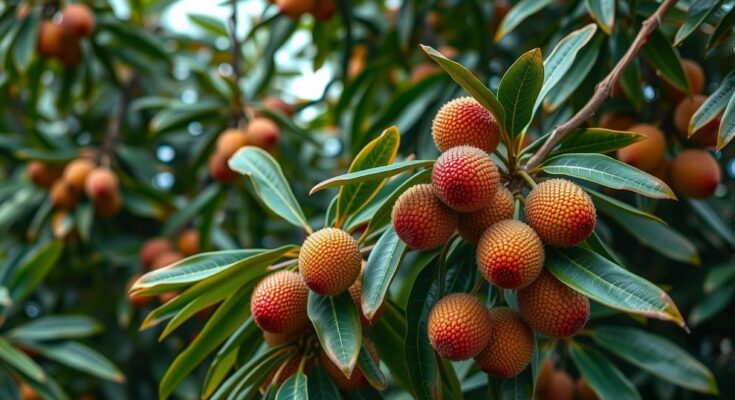Madagascar’s lychee production is facing a crisis as forecasts predict a significant drop in yields due to excessive rainfall and unfavorable climatic conditions. This situation has raised concerns regarding the economic impact on growers and exporters, especially in Tamatave. Options to mitigate the shortfall are being explored, including sourcing from remote areas and potential adjustments to loading times for shipping. The volatility in agricultural yield underscores the urgent need for sustainable solutions in response to climate change.
Madagascar is currently experiencing a significant crisis in its lychee production as the harvest season commences. The island nation, recognized as the world’s foremost producer of lychees, is facing alarming forecasts that predict a steep decline in yields this year. The situation is particularly tense in Tamatave, a key port city, where industry leaders are concerned about the economic repercussions of this unexpected downturn. The challenging circumstances are attributed to various factors, primarily the excessive rainfall recorded earlier this year, approximating 2,500 millimeters, which has severely hindered the growth of lychee plants. Judith Riccati, the Deputy Executive Director of the Tamatave Horticultural Technical Centre, explains that the heavy rains have prompted early flowering in some trees while also damaging many blooms. Furthermore, lychee trees thrive under specific climatic conditions that require a drop in temperature to around 15-16 degrees Celsius, a prerequisite that has proven difficult to achieve this year. Aging trees further complicate their response to such climatic changes. In response to the anticipated shortfall, agricultural engineers are considering strategies to mitigate the impact. One potential approach is to reduce export quotas, although this may no longer be feasible given existing orders and logistical commitments. Another possibility involves extending the harvest period by sourcing lychees from more remote regions; however, this would necessitate longer loading times for delivery ships, which are currently restricted due to financial constraints. Notably, discussions regarding the extension of loading periods have been ongoing for over two decades without implementation. As Madagascar’s agricultural sector grapples with increasingly erratic weather patterns, the urgency for sustainable solutions becomes critical. The repercussions of these climatic challenges extend beyond the immediate lychee crop, signifying a broader impact on the agricultural framework of the nation.
Madagascar stands as the leading global producer of lychees, a tropical fruit highly sought in the European market, particularly during the end-of-year harvest season. The onset of the lychee harvest brings both opportunities and challenges. This year, weather anomalies and their effects on tree health have presented a substantial crisis for growers and exporters. The industry has been significantly affected by climatic factors, particularly unusual rainfall patterns that have disrupted growth cycles and flowering processes. Transformations in climate, coupled with the aging of the trees, have combined to create a precarious situation for the lychee harvest, raising concerns regarding both yield and economic viability.
In summary, Madagascar’s lychee growers are facing a critical crisis due to projected declines in production linked to adverse weather conditions. With excessive rainfall disrupting growth and old trees struggling to adapt, immediate action is required to counter the potential economic fallout. As solutions are explored, the importance of fostering sustainable agricultural practices becomes increasingly apparent to safeguard the future of this vital industry.
Original Source: www.rfi.fr




